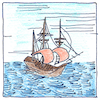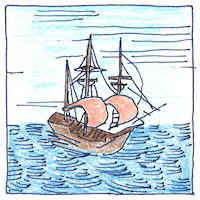Francis Bacon
philosophy of science

|
Scientific method
Francis Bacon demanded procedures for investigating nature, moving from experimental data to axiom and then to physical law using inductive reasoning and isolating the formal causes.
Novum Organum Scientiarum
Francis Bacon knew we need to overthrow preconceived notions, the idols of tribe, of individual peculiarity, of a concern more for semantics than for the material world, and of philosophical dogma. * If we have any humility towards the Creator; if we have any reverence or esteem of his works; if we have any charity towards men, or any desire of relieving their miseries and necessities; if we have any love for natural truths; any aversion to darkness, any desire of purifying the understanding, we must destroy these idols, which have led experience captive, and childishly triumphed over the works of God; and now at length condescend, with due submission and veneration, to approach and peruse the volume of the creation; dwell some time upon it, and bringing to the work a mind well purged of opinions, idols, and false notions, converse familiarly therein.
Shoulders of giants
Alhazen stressed the need for experimentation. Robert Grosseteste introduced to the West the controlled experiment. Roger Bacon said that the basis of experimental science must be mathematics. Andreas Vesalius did his own dissections. For his medical students, Niccolò Leoniceno established a botanical garden. Galileo Galilei built telescopes so that others could verify his observations. Nevertheless, the old philosophical process of syllogism based on the work of classical writers such as Aristotle and Galen persisted among natural philosophers well into the nineteenth century.
Not enough
It is not, generally, enough for one to be, demonstrably, a genius producing works of lasting value. One must also be the kind of person whom others in one’s time and place approve of. Tell me when idiosyncrasy goes out of fashion. That will be the time for me to withdraw into a cave.



Francis Bacon played a leading role in the establishment of British colonies in the New World, even drafting the charters of the Virginia colony. The utopian principles described in his work The New Atlantis were an inspiration for Rosicrucian communities in Pennsylvania and elsewhere. He wrote, concerning the establishment of colonies, “To make no extirpation of the natives under pretense of planting religion: God surely will no way be pleased with such sacrifices.”
See also in The book of science:
Readings in wikipedia:
Other readings: